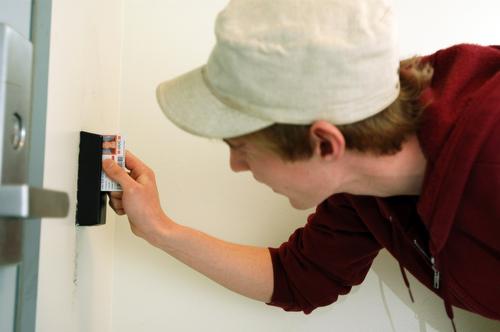Prevalence of i-card theft raises staff concern

Ryan Seramur, freshman in LAS, swipes his i-card in order to gain entry into the Pennsylvania Avenue Residence Halls Wednesday. Beck Diefenbach
April 17, 2007
The ongoing problem of i-card thefts at the University has become a preoccupation for staff members in campus recreational centers, housing and library facilities.
Campus ID center supervisor, Jennifer Rexroad, explained that students are provided more and more access to various events and facilities with their i-cards, providing others with the incentive to steal them.
According to the i-card program’s Web site, student i-card options have diversified, combining both functionality and convenience. However, it has also increased the desperation of obtaining unauthorized i-cards.
“About 2,000 i-cards are stolen per semester and we provide at least 44,000 replacement cards,” Rexroad said. “I-cards are mainly stolen when bags or wallets are left unattended in public facilities such as the library or Illini Union.”
The Campus ID Center, which is located at the Illini Union Book Store, issues replacement i-cards for a fee of $20. Once reported, the stolen i-card is immediately deactivated. Rexroad also said that cardholders are advised to report stolen cards to campus police.
Get The Daily Illini in your inbox!
Dustin Boyer, Campus Recreation management staff member and junior in AHS, said that many i-card thefts occur on basketball court sidelines and locker rooms as well.
“Many times students have seen their locker doors ripped open,” Boyer said. “We tried to solve this problem by encouraging students to use their own locks as the electric code boxes are not reliable.”
However, along with i-card theft, the public has been concerned with the problem of identity theft.
“To our knowledge, there have been no cases of identity theft reported,” said Kathleen Cooke, coordinator of i-card services. “However, the units that provide services sometimes run into problems with attempted fraud.”
Cooke further explained that there are policies in place for units to confiscate cards and send offenders through a student disciplinary process if they commit fraud by attempting to pose as another to receive an i-card.
I-card services have adopted conditions which will help to deter identity theft.
First, they require that government-issued photo IDs are presented when receiving your i-card.
This ensures that i-cards are issued to legitimate campus community members and guests.
Secondly, the University Identification Number, or UIN, is given to every student in order to restrict the use of a Social Security Number, which is especially valuable to identity thieves.
Lastly, the ability to have electronic verification to campus units can confirm a person’s eligibility to receive services.
The i-card program’s office has provided brochures to remind students about the importance of i-cards and to emphasize careful usage.
Campus ID staff believe that with raising campus awareness, students will think twice about where they place their belongings.
“The goal of i-card programs and ID centers is to improve service in identity assurance and carding operations,” Cooke said. “The i-card is a secondary proof of identity required for a special purpose – working, studying or visiting at the University campus only.”






